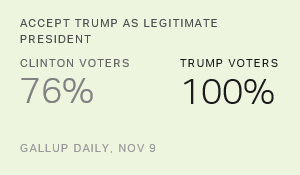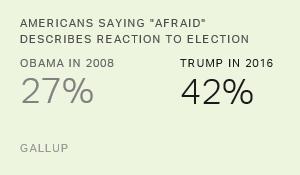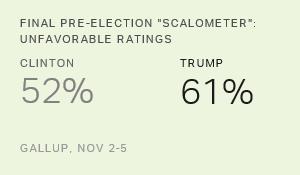Story Highlights
- 76% of Clinton voters say Trump is legitimate president
- 60% of Clinton voters say election has caused permanent harm to U.S.
- Views of this election similar to 2000 election
PRINCETON, N.J. -- After Donald Trump's surprise defeat of Hillary Clinton in the highly contentious 2016 presidential campaign, 84% of Americans say they accept Trump as the legitimate president, but 15% do not. Among Clinton voters, 76% accept Trump and 23% do not.
| National adults | Trump voters | Clinton voters | |||||||||||||||||||||||||||||||||||||||||||||||||||||||||||||||||||||||||||||||||||||||||||||||||
|---|---|---|---|---|---|---|---|---|---|---|---|---|---|---|---|---|---|---|---|---|---|---|---|---|---|---|---|---|---|---|---|---|---|---|---|---|---|---|---|---|---|---|---|---|---|---|---|---|---|---|---|---|---|---|---|---|---|---|---|---|---|---|---|---|---|---|---|---|---|---|---|---|---|---|---|---|---|---|---|---|---|---|---|---|---|---|---|---|---|---|---|---|---|---|---|---|---|---|---|
| % | % | % | |||||||||||||||||||||||||||||||||||||||||||||||||||||||||||||||||||||||||||||||||||||||||||||||||
| Yes, accept | 84 | 100 | 76 | ||||||||||||||||||||||||||||||||||||||||||||||||||||||||||||||||||||||||||||||||||||||||||||||||
| No, do not | 15 | 0 | 23 | ||||||||||||||||||||||||||||||||||||||||||||||||||||||||||||||||||||||||||||||||||||||||||||||||
| Nov. 9, 2016 | |||||||||||||||||||||||||||||||||||||||||||||||||||||||||||||||||||||||||||||||||||||||||||||||||||
| Gallup | |||||||||||||||||||||||||||||||||||||||||||||||||||||||||||||||||||||||||||||||||||||||||||||||||||
The results are from a one-night Gallup poll conducted Nov. 9, the day after the presidential election. Trump's victory spurred protests around the nation, with protesters commonly chanting "not my president." Those protesters' sentiments are shared by about one in six Americans, and one in four Clinton voters.
Gallup asked the same question about George W. Bush in December 2000, and found 83% of Americans accepting Bush as the legitimate president, essentially the same as the percentage who now accept Trump. That poll was conducted just after the Supreme Court voted 5-4 to end a contentious recount in Florida, which allowed Bush's original slim Florida vote margin to stand and effectively made him president.
Perhaps understandably, Al Gore supporters were somewhat less likely (68%) than Clinton voters today (76%) to accept the president-elect as legitimate. The overall numbers are similar, though, because Americans with no candidate preference in 2000 were more likely to accept Bush as legitimate than the comparable group this year is to accept Trump.
Like Gore, Clinton won the popular vote but lost the Electoral College. However, Trump's Electoral College tally is more decisive than Bush's and not dependent on favorable legal rulings. Still, just as many Americans say they cannot accept Trump as president as said the same about Bush. Trump's controversial statements, actions and policy proposals may cause some Americans to view him as unworthy of the office, even though his victory was beyond dispute.
Substantial Minority Say Election Process Has Done Permanent Harm
The 2016 election campaign was characterized by its negative tone. Much of the campaign and discussion in the presidential debates centered on personal attacks. Americans rated the campaign more negatively than any in recent memory. Even so, the majority, 58%, say the 2016 election process has not caused permanent harm to the U.S., although 38% say it has. Clinton voters are much more likely than Trump voters to say the campaign has caused permanent harm to the country, 60% to 17%.
| National adults | Trump voters | Clinton voters | |||||||||||||||||||||||||||||||||||||||||||||||||||||||||||||||||||||||||||||||||||||||||||||||||
|---|---|---|---|---|---|---|---|---|---|---|---|---|---|---|---|---|---|---|---|---|---|---|---|---|---|---|---|---|---|---|---|---|---|---|---|---|---|---|---|---|---|---|---|---|---|---|---|---|---|---|---|---|---|---|---|---|---|---|---|---|---|---|---|---|---|---|---|---|---|---|---|---|---|---|---|---|---|---|---|---|---|---|---|---|---|---|---|---|---|---|---|---|---|---|---|---|---|---|---|
| % | % | % | |||||||||||||||||||||||||||||||||||||||||||||||||||||||||||||||||||||||||||||||||||||||||||||||||
| Permanent harm | 38 | 17 | 60 | ||||||||||||||||||||||||||||||||||||||||||||||||||||||||||||||||||||||||||||||||||||||||||||||||
| No permanent harm | 58 | 82 | 38 | ||||||||||||||||||||||||||||||||||||||||||||||||||||||||||||||||||||||||||||||||||||||||||||||||
| Nov. 9, 2016 | |||||||||||||||||||||||||||||||||||||||||||||||||||||||||||||||||||||||||||||||||||||||||||||||||||
| Gallup | |||||||||||||||||||||||||||||||||||||||||||||||||||||||||||||||||||||||||||||||||||||||||||||||||||
Gallup asked the same question in the aftermath of the 2000 election, and found similar results, with 59% of Americans saying the election process did not cause permanent harm but 39% disagreeing and saying it did.
Although there were differences between Gore (50%) and Bush (28%) supporters in their perceptions that the process caused permanent harm, the 22-percentage-point gap was not nearly as large as the 43-point gap between Trump and Clinton voters today. The widening gap between candidate support groups since 2000 may reflect the more polarized political environment of recent years.
Implications
Trump frequently claimed the election process was rigged against him and famously would not commit to accepting the outcome of the election in the third presidential debate. Now, the often mean-spirited presidential campaign has ended -- with Trump winning, Clinton conceding and both candidates calling on Americans to put aside their differences and come together as a nation.
The vast majority of Americans, 84%, say they accept Trump as president, and 58% do not believe the election process has permanently harmed the nation. Whether those figures are typical for most elections is unclear, although they are almost identical to what Gallup measured in 2000, when the outcome was in doubt until the Supreme Court sided with Bush.
While most of Clinton's supporters have followed her lead in acknowledging Trump as the legitimate president, about one in four still have not. Many Clinton voters in the same Nov. 9 poll expressed a wide array of negative emotional reactions to the outcome, including being afraid, angry and devastated. Some of those emotions have been on display in the anti-Trump protests.
Those negative emotions may take time to heal, given the unexpected nature of Trump's victory. Most pre-election polls and forecasting models pointed toward a Clinton win. Trump was the most unpopular presidential candidate in modern polling history, and a majority of Americans had a strongly unfavorable view of him during the campaign. Consequently, he faces a steep climb to win over the public. And while new presidents typically enjoy a honeymoon phase in the early months of their presidencies, Trump may begin his term with less public support than any prior president.
Survey Methods
Results for this Gallup poll are based on telephone interviews conducted Nov. 9, 2016, on the Gallup U.S. Daily survey, with a random sample of 511 adults, aged 18 and older, living in all 50 U.S. states and the District of Columbia. For results based on the total sample of national adults, the margin of sampling error is ±5 percentage points at the 95% confidence level. All reported margins of sampling error include computed design effects for weighting. Polls conducted entirely in one day, such as this one, are subject to additional error or bias not found in polls conducted over several days.
Each sample of national adults includes a minimum quota of 60% cellphone respondents and 40% landline respondents, with additional minimum quotas by time zone within region. Landline and cellular telephone numbers are selected using random-digit-dial methods.
View survey methodology, complete question responses and trends.
Learn more about how the Gallup U.S. Daily works.



